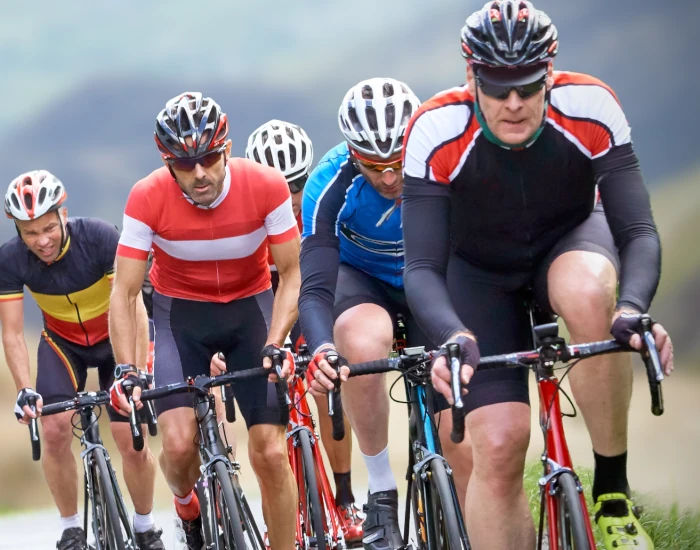
Competitive cycling and sportive events have surged in popularity, but the physical demands and high speeds have also led to more injuries among participants.
If you've been injured in a cycling event, you might assume you accepted the risks and can't claim compensation. However, depending on the circumstances, pursuing a claim may still be possible.
Understanding liability in cycling events
In all personal injury claims, establishing liability is key. During cycling events, participants, organisers, and other road users have a duty of care. This duty is a legal obligation to take reasonable steps to prevent harm to others. However, as competitive events carry inherent additional risk, assessing liability can be complex.
Safety protocols should be put in place by organisers to minimise risks. For example, closed-road events limit or restrict access to other vehicles, while safety marshals may be stationed along the route. Even with precautions in place, accidents can happen, and liability may fall on different parties depending on the cause of the accident.
Common cycling event injuries
Cycling events can lead to a variety of injuries, from fractures and road rash to more serious issues like head or spinal injuries.
If you are injured in a cycling event, documenting your injuries immediately by seeking medical attention and obtaining an injury report is critical if you decide to make a claim.
Is the organiser liable?
Organisers are generally responsible for creating a safe environment for participants. You might have a case against the organisers if:
The course was unsafe
Poorly maintained roads, unmarked hazards, or inadequate signage could indicate organiser negligence.
Safety measures were inadequate
If the organisers failed to secure high-risk areas or neglected to provide marshals in key spots, they may be held responsible for your injury.
Insufficient event briefing
Organisers should provide all participants with a comprehensive safety briefing and information about potential hazards. If you believe the organisers did not take reasonable precautions, a solicitor can help investigate and determine liability.
Claiming against another cyclist
Claims against other cyclists can also be possible if another rider’s reckless overtaking or rule-breaking led to your injury. However, many cyclists lack third-party liability insurance, which can make compensation more challenging to secure.
Cycling-specific insurance, often available through memberships with organisations like British Cycling, may cover such cases, easing the claim process if the other cyclist is insured.
What if there was fault on both sides
If another party directly caused your injury, such as through reckless riding by a fellow cyclist or careless driving by a motorist, they may be liable.
Sometimes, both parties share responsibility. For example, if you were riding too close to another cyclist who caused an accident, your compensation might be reduced according to your contribution.
Read more:
Can I claim if I was partly responsible for my accident?
Insurance and waivers
Most competitive events require participants to sign waivers acknowledging the inherent risks. While these waivers are meant to protect organisers, they are not a shield that an event organiser can hide behind in the event of negligence.
A waiver typically limits liability for standard risks, but it doesn’t exempt organisers from responsibility if they fail to meet basic safety standards.
Additionally, participants with cycling insurance or personal accident cover may be able to claim for injuries sustained during an event. This insurance may include coverage for hospital bills, lost earnings, and rehabilitation costs.
What to do if you’re injured in a cycling event
If you’re injured during a cycling event, follow these steps to support your claim:
Seek medical attention
Get immediate medical care and ask for a copy of your medical report as evidence of your injuries.
Gather evidence
Take photos of the scene, your injuries, and any damaged equipment. Record the details of the incident, including time, location, and road conditions.
Collect witness contact information
Obtain contact information from any witnesses, including other cyclists or event staff, who can confirm the circumstances of the accident.
Report the accident
Notify the event organisers and request an official incident report if available.
Contact a solicitor
A solicitor specialising in cycling claims can assess your case and advise on the best way to proceed.
How we can help with your claim
A cycling injury solicitor can provide invaluable assistance in investigating the incident, gathering evidence, and navigating any complexities involved in a claim. They can handle communication with the other party’s insurance company, negotiate compensation, and represent you in court if necessary.
Claims are handled on a no win, no fee basis, meaning you only pay if your claim is successful.

 Written by Chris Salmon on 16th October 2024
Written by Chris Salmon on 16th October 2024
